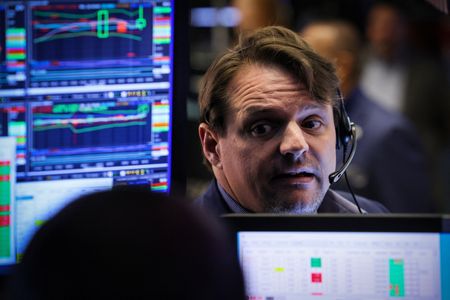By Alden Bentley, Alun John and Tom Westbrook
NEW YORK/LONDON/SINGAPORE (Reuters) -Global share benchmarks rallied farther into uncharted territory on Thursday and yields on government debt mainly fell after the Swiss National Bank became the first major central bank to ease policy in this cycle, a day after the Federal Reserve maintained its outlook for 2024 rate cuts.
The dollar rose as the Swiss franc eased and the yen stayed on the back foot, near its lowest level in about four months.
Wall Street closed with all three major indexes extending their streak of record highs, on the heels of similar milestones earlier in Japan and Europe and in gold.
A risk-on mood was fanned on Wednesday when the Federal Reserve ended its regular meeting with no change in U.S. rates, or its “dot plot” projections to cut rates by 75 basis points this year.
Its announcement was interpreted dovishly by investors who had lately been wondering if the Fed would scale back its projections for cuts this year due to stubbornly high inflation.
“Usually when you see the dollar rally, you’ll see stocks fall off, but probably with that Swiss National Bank news it kind of changed things around,” said Joe Saluzzi, co-manager of Themis Trading in Chatham, New Jersey.
When Fed chair Jerome Powell on Wednesday “talked about the balance sheet and how they want the balance sheet to run off a little bit slower – I don’t want to call it ‘QE light,’ but by them not shrinking it as fast, I think it’s a bullish thing for the market,” Saluzzi said.
The Bank of England on Thursday wrapped up a busy week for global central banks by leaving rates unchanged but saying the British economy is “moving in the right direction” for it to start cutting interest rates.
The decision helped Britain’s resource-heavy FTSE 100 index to rise further, last up 1.9%, and weakened the pound by 1.04% to $1.2654.
The bigger drama was in Switzerland, where the Swiss National Bank cut its main interest rate by 25 basis points to 1.50%, a surprise that caused the currency to weaken.
The euro rose by as much as 1.2% to 0.978 francs, its highest since July 2023, and the dollar strengthened 1.27% to 0.898 franc, hitting a four-month high.
Europe’s STOXX 600 index extended its record run to another high and was up 0.9%. Swiss bond yields fell.
“We’ve watched with great interest Powell’s speech and the SNB (Thursday), and it broadly validates the narrative that, although we had a bit of heat in some inflation prints and services inflation, overall, central banks are in a relatively comfortable spot,” said Samy Chaar, chief economist at Lombard Odier.
“The area where it was most comfortable is Switzerland because inflation is constrained, and let’s keep in mind they (the SNB) had to revise their inflation forecast significantly down,” Chaar added
After the Fed left U.S. rates on hold between 5.25% and 5.5%, as expected, Powell said that recent high inflation readings had not changed the underlying story of slowly easing price pressures, and he affirmed that solid economic growth will continue.
Market pricing currently reflects expectations that the Fed and the European Central Bank will start cutting rates at their June meetings.
The Dow Jones Industrial Average was up 269.24 points, or 0.68%, the S&P 500 gained 16.9 points, or 0.32% and the Nasdaq Composite gained 32.43 points, or 0.2%.
Earlier, Japan’s Nikkei and Taiwan weighted index each climbed 2% to record levels. [.T] [.N]
MSCI’s gauge of stocks across the globe rose 5.28 points, or 0.68%.
U.S. Treasury yields dipped in early trade then ticked higher, helped by a fall in weekly jobless claims and a solid manufacturing Purchasing Managers’ Index report.
The U.S. 10-year yield was down 0.2 basis points to 4.269%. The 2-year note yield, which typically moves in step with interest rate expectations, was up 3.9 basis points to yield 4.6427%.
Germany’s 10-year yield was down 3 basis points around 2.40%.
The dollar index gained 0.765% to stand at 104.02, with the euro down 0.59% at $1.0858.
The Japanese yen weakened 0.25% to 151.635 per dollar.
Lower yields also helped non-yielding gold rise to a fresh record high of $2,222.39 an ounce, though bullion was last off 0.22% near $2,181 an ounce. [GOL/]
U.S. crude lost 0.47% to $80.89 a barrel and Brent fell to $85.59 per barrel, down 0.41% to on the day.[O/R]
(Reporting by Alden Bentley; Editing by Sam Holmes, Will Dunham and Miral Fahmy)


